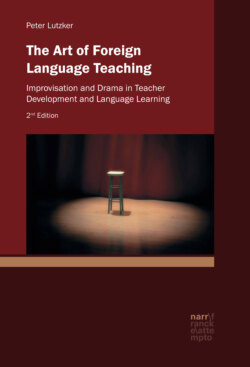Читать книгу The Art of Foreign Language Teaching - Peter Lutzker - Страница 55
На сайте Литреса книга снята с продажи.
5.4 Clowning and Deep Ecology
ОглавлениеAlthough most of the participants in Gladwell’s workshops come from the social professions, there are some interesting exceptions. The field of deep ecology is a relatively new field which has increasingly gained recognition as a field of research. Chris Seeley from the University of Bath worked on a project examining the possible implications of clowning courses in the field of Deep Ecology. She writes,
Deep Ecology means living as if the world is alive. It offers a vision of our place in the world as ordinary members of the earth community, where there is a deep sense of belonging to a sentient world and a nourishing human society. Deep Ecology asks of us to live our relationship to the world and each other with compassion and to look at the sacredness of life.
In clowning, you learn that what is important is not how you control life but how you receive and respond to life. You are invited to let go of the thinking, controlling part of yourself and open yourself to what is authentic and present in the here and now. You practice a highly emotional and responsive relationship to the world. You are constantly informed by your audience’s reaction to what you do and by your feelings. With practice, you become highly receptive to and in empathy with the world around you, your audience, your clowning partners and yourself.231
In Seeley’s emphasis on the heightening of responsiveness to the world, there are also parallels to the reports of professionals in social work. The qualities of listening and empathy which were stressed in the context of the social professions have their pendant in relations to the non-human world:
In Deep Ecology, we need to develop and refine our receptivity to the more than human world. (…)We need this degree of sensitivity when thinking about human activity and its effects on the planet. Deep ecologist Joanna Macy suggests that we are in a kind of mass denial of the harm that we are doing around us. This points to the importance of remaining sensitive to the consequences of our actions. Clowning demands that we address and live with this realisation. Macy proposes that we need to work in such a way that we can grieve and then move on into action again rather than get stuck in denial.232
The connection established here between a heightened responsiveness to the world and taking positive action illuminates a central theme of both ecology and clowning. It is obvious that for professionals who are deeply involved in ecological issues, there are inherent dangers of being overwhelmed by frustration and despair. In a field where a heightened sense of creativity and energy are imperative, an attitude of resignation discourages imaginative and original thinking. She writes,
It is vitally important that other perspectives are brought in. The whole field is full of people who are burnt-out, exhausted and over-worked.233
Seeley’s research led her to believe that clowning and improvisation workshops, characterized by lightness, playfulness and humour, can play an important role in the field of deep ecology, offering an antidote to despair:
Joy is vitally important in clowning. Clowns are incorrigible optimists in the face of all the tragedies that befall upon them. There is a need to encourage this kind of resilience, to support people in continuing to respond to desperate situations in joyful ways. So we act out what we can do to make this world more beautiful to live in. It is like being driven by love and not by fear. Scare tactics run the risk of setting us more rigidly in fear. (…) Clowning can bring deep ecology to life as a living experience, as a generative and creative response to the world.234
Seeley sees clowning workshops for ecologists as a source for generating enthusiasm and involvement, as well as distance and humour. As will become clear in the next chapters, there are significant and far-ranging connections in this regard to the workshops for language teachers.
